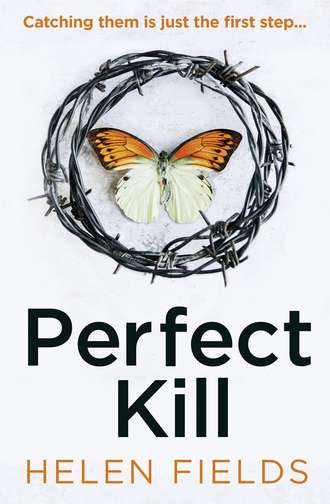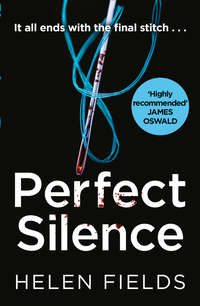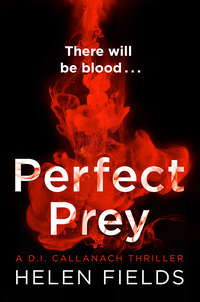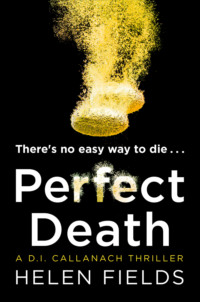
Полная версия
Perfect Kill
He stared at the walls, as if by concentrating hard enough he would be able to see the faces that lay beyond. Were these his rescuers? His assailants? Raising one bruised and shaking hand, he paused before knocking. He had no idea how long he’d been trapped inside – days, he assumed – but already his prison felt safer than the unknown beyond. In the outside world he’d been kidnapped and removed from everything and everyone he loved. He had no idea why or by whom. He’d never expected to fall victim to such evil. Now it was all he could think about. Every face he saw would be a mask, every word a lie. He would never be able to trust anyone again.
A scraping-crunching came from one upper corner of the cell before Bart found his courage. He backed away. The first clear light pierced the gloom to reveal a scene that had him cringing with embarrassment in spite of the horrors he’d endured. A blast of fresh air only served to intensify the stench of human waste that Bart had become used to, but now he could see it. The bucket he’d been using had overflowed with the journey and the floor was awash. He held his filthy hands in front of his face. Now he could smell himself, too, and felt a desperate urge to vomit as the end of his prison was crowbarred away to the sound of ripping wood. Beyond the opening it was too bright for his eyes to focus.
‘Help me,’ he whispered.
‘Pick him up,’ a man said. Heavy boots crossed the wooden cell. Two men took an arm each in gloved hands, dragging him out into the daylight.
Bart breathed deeply, his eyes closed, feeling weak sunlight on his face and doing his best to muster some strength in his legs. His eyes were taking their time adjusting to the brightness. After a few steps, the men lowered him to the ground and he sank gratefully to his knees. An open bottle was thrust into his hands. He sniffed it, registered nothing but cold water, and swallowed the bottle in one go. A car park appeared in blurred patches. A few vans, gravel, brown grass around the edges, no buildings in sight – nothing that gave him any indication where he was. Behind him, on the back of a massive lorry, was a cargo container. He blinked, made an effort to keep down the water, and rubbed his sleeve over his eyes. Inside the container was a thick-walled wooden cell, the end wall prised off. A second bottle of water was handed to him.
‘Slowly,’ a man said. ‘Then eat.’ A loaf of bread in a tatty brown paper bag was thrown down to him. The tone and the treatment were all the confirmation needed of his status. His vision was clear now, as was his sense of smell. He stank. Not like he imagined a human who’d been incarcerated would, but like an animal. All filth and sweat, the sort of smell found in farms and abattoirs. The men around him seemed not to notice. They weren’t surprised by the state of him. Which meant they’d done it before.
He grabbed the bread, which looked like a gourmet offering compared to the box of stale snacks that had been left in the container for him. Even so, he’d consumed it all early in the journey and been left desperate for more. Once you realised what true hunger was, seizing food no matter what position you were in was more instinct than choice. As he ate, men wandered into his former home with buckets. The sound of sloshing water hit the floor and streams of filth ran out. Another brought several heavy-duty plastic cartons from the back of a van, with boxes of what must have been food supplies, similar to those he’d found.
‘I can’t go back in there,’ he told the man closest to him through a mouthful of bread. ‘Can’t do it.’
The man ignored him, and barked orders to others, tapping on his watch. Faster movement followed, guns were drawn and men approached the backs of two vans.
‘Head down,’ Bart was ordered. When his reaction time wasn’t fast enough, he was assisted with a slap to the back of his scalp.
He kept his head angled down, but his eyes up. The van doors opened slowly. The men reached in, pulling out the occupants of the vehicles. One by one, women appeared, hands tied, moving slowly, blinking at the sudden change in environment. Their faces were dirty and their clothes shabby, but they weren’t in the same dreadful state as Bart. Not yet, but then they were ushered towards the container. One woman began to cry, and it spread through them like a virus, the women either side succumbing to tears, another going straight into a wailing sound as if she had only been waiting for a prompt. Bart kept count. Four women from one van, five more from another. He hoped for their sakes that they were given several more buckets for the journey.
One woman fell to her knees, then let herself go to the floor face first, sobbing, begging in the universal language of terror and desperation. A guard gave her an order. She didn’t move. That earned her a kick. She reached out for the man’s ankle, grabbing it, pulling herself towards his feet. He leaned down, snatching a bunch of her already matted hair, wrenching her face upwards to look into his eyes. He spat, waved the gun in her face. She sobbed some more.
Bart wanted to say something. In the dim recesses of his mind he imagined a braver man, a stronger male specimen who had not been so broken by his ordeal, springing up, wrestling a gun from one of the men, shooting off a couple of bullets to show he meant business, before taking command of the situation and freeing them all. What he did was let his face fall to the dirt. What he didn’t see couldn’t hurt him. Instead, he heard all he needed. In spite of the constant mechanical noise of the previous days – he wasn’t quite sure of the time period – his ears were as alert as ever. He heard another kick, that soft whoosh of air as foot contacted stomach. More crying. Laughter. Another man’s footfall, heavy, slow, deliberate. Then the unmistakable sound of a zip being lowered. Liquid hitting skin in a constant stream. The woman let out a howl that was end-game hopelessness. The reduction to nothing more than disposable goods was complete. As Bart opened his eyes, the woman was crawling away through the dirt, following the others into the black hole that he’d just escaped. The men picked up the wooden end wall of the cell, took nails from their pockets, gathered hammers, and began to seal it up. The hammering from the outside was matched blow for blow by the sound of fists hitting the inside of the wood. Bart had time to wonder if the men had bothered to replace the batteries inside the lamp. As pathetic as it was, that tiny spark had been everything to him in the endless dark.
He looked past the man standing over him.
‘I need to pee,’ he said. ‘Where do I go?’ The bottles of water had run through him like fresh rain off dried mud.
The man pointed at the ground where Bart sat. He was going nowhere. If he needed to piss, it was right there or not at all. He did what he needed, watching as the enormous container door was swung shut. A wooden cell within a metal prison. Enough noise externally that no one would ever be heard within. He wished vaguely that he hadn’t bothered ripping his vocal chords to shreds for nothing. With one hand taking care of business, he used the other to dip into the rear pocket of his jeans, clutching his most treasured possession, loath to sacrifice it, but who knew where he might end up next? If this was his only chance to leave a note, a record of his passing, then he had no choice. He waited until all eyes were elsewhere, then dropped the photo of his father behind him in the dirt as he zipped up his jeans.
Ten minutes later and the container was gone, driven away on the back of a lorry by three of the men. Two others climbed into the unmarked white vans from which the women had disembarked, leaving one final van and a car. The women were obviously being trafficked, presumably for sexual exploitation or into slavery. What he had no understanding about whatsoever was why he was there. He figured he would find out soon enough, and the answer wasn’t going to be one he wanted to hear. So he just didn’t ask. He wondered what the men thought of him, on his knees between a puddle of his own urine and a stream of someone else’s, not even asking for his freedom. Not begging, not trying to run. Just doing nothing. His life had gone from hopes and dreams to a nightmare in such a short timeframe that his head was spinning with it. Just survive for the next five minutes, he thought. After that, I’ll worry about another five. If I make it to tonight, I’ll worry about the morning. The bread sat in a hard lump in his stomach. He would comply. There was no point annoying his captors. He would watch and learn. Information, he heard his father say inside his head. You can’t run if you don’t know where you’re running to. You can’t fight if you don’t know your enemy’s strengths. And you can’t do anything at all dehydrated and starving. Eat and drink whatever they offer, Bart told himself. Sleep when it’s safe. Don’t hope. Plan.
‘Car,’ one of the men said. ‘Now.’
Bart stood up and stretched.
‘More water?’ he asked.
The men looked at one another, until someone shrugged and reached into the van, throwing another bottle in Bart’s direction.
‘Piss in my car and I’ll cut your dick off,’ he was warned. ‘Turn round.’
He was marched to the boot of the car and told to climb in. The floor was covered in old blankets that smelled of dog. He was given a moment to take another drink before his hands were tied behind his back.
‘I hear you bang or shout, I pull over and fucking gut you. Get in.’
Bart did as he was told. The container lorry had headed north, as far as he could tell from the position of the sun and the fact that the day was still warm with some hours of sunlight to go. The car was pointed in the other direction. It was a straightforward exchange then. Made sense. Why pay for a container if it only held goods to trade in one direction? Two or three of the men had spoken French to each other. His journey, while it had seemed endless, could only have been a couple of days. France seemed like the logical point for them to have docked in that timescale. The women had spoken a language he hadn’t recognised though. A couple of them had been very dark-skinned, but the majority looked more Eastern European. Either they’d been kidnapped or they’d thought they had found a passport to a new and better life. That was almost crueller. Paying their captors for the prospect of safe passage and finding the opposite, their families left to wonder what had happened to them and why they’d never contacted them again.
It made Bart think of his own mother. She, at least, would have called the police by now. People would be looking for him, retracing his last known steps. His friends would be plaguing social media with requests for shares and information. Somewhere, someone had to have seen something that could lead to him. The woman he’d dated twice, if meeting for coffee could be considered a date, had offered him a lift home from the restaurant. Her name had been Kitty, or maybe she’d said it was a nickname. They hadn’t progressed to surnames. That was as much as he could recall. There was no CCTV in the main restaurant dining room, but there was a camera on one of the doors to capture images of any diners who decided that paying for their meal was not a good option. Would Kitty have thought of that? Perhaps she’d worn a wig, or changed her face with makeup. Even he couldn’t quite reconstruct her in his mind.
His poor mother. She would be frantic. That was a good thing in the circumstances. She wouldn’t rest until he was found. The car started up, and he jammed his feet to keep from rolling around and hurting himself. Steady, he told himself. Don’t get injured. He tried to focus on the distance as they travelled. He tried to figure out the left and right turns, and to create a map in his mind. But it was warm, the car rocked gently, and the stinking blankets were a soft enough bed. And he was exhausted. When Bart woke up, the first thing he saw was chain-link fence.
Chapter Eight
Indrani Desai was waiting in Jean-Paul’s office – currently also Callanach’s desk space – at 7.30 a.m., wearing a traditional sari and spaghetti-strap gold sandals. Jean-Paul took the seat nearest her, offering drinks that she refused and his hand that she also opted not to shake. Callanach watched Jean-Paul look at her admiringly. His old colleague had never had much of a poker face when it came to women.
‘Forgive me if it seems rude, but I try not to transfer any oils onto my own skin. Sometimes a residue of a scent can throw me off when I’m working,’ she explained.
‘You’ve been to see Malcolm Reilly’s body?’ Callanach asked.
‘I have,’ she nodded. ‘Not a normal part of my job. Aromachologists design scents for shops and supermarkets. Sometimes I work with athletes putting together aromatherapy packages for them. That was the first time I’ve worked on a dead body and even though I only saw the head uncovered it was … awful.’
‘I’m sorry,’ Jean-Paul said. ‘It’s the worst part of what we do. I know it was an unusual request for you to smell his hair. Were you able to pick anything up?’
‘I was,’ Indrani confirmed. ‘He was in a sealed bag, so when the plastic was first opened I caught a strong whiff. It dissipated in minutes though. I’m afraid it wouldn’t pass a scientific test if you were looking for me to give evidence in court.’
‘At the moment we just need whatever leads we can get,’ Callanach said. ‘What was your conclusion?’
‘Myrrh. Burned near to his head. The smell was smoky and slightly impure, but myrrh itself has a very specific liquorice note to it. Earthy and rich, but with a contrasting lemon scent. Some people say they smell latex, too. It’s quite unique. I’m surprised you picked it up given all the chemical odours in the mortuary,’ she told Callanach.
‘Sorry, how did you know it was me?’ he asked.
‘The pathologist described you to me. He said you were the one with the symmetrical face.’
‘Yes, well, Detective Inspector Callanach gets a lot of that,’ Jean-Paul snapped. ‘Could you tell us where someone might get hold of myrrh and what it might have been used for?’
He gave Callanach a look that was a throwback to days Callanach was happier not remembering, when they’d spent weekends and holidays partying together, and women had been their constant companions. Indrani Desai was far from the first woman Jean-Paul had been attracted to who had seemed more interested in Callanach. In their younger days it had been a source of simple ribbing. Now it seemed Jean-Paul didn’t find it quite so amusing. Callanach himself wasn’t the slightest bit interested. He was only there for Malcolm Reilly.
‘It can be anything from just making a place smell good, to a belief that myrrh is an antioxidant. It’s from a tree sap. There are all sorts of claims made about its medical properties, including a treatment for arthritis, neuropathic pain, for asthma and indigestion. It’s generally regarded as being purifying and cleansing; certainly it has antiseptic properties. It can also be used for embalming. Historically, it’s been used for centuries as part of rituals. You know the Bible reference, obviously, but most cultures have used myrrh at some point. Today you find it in candles or essential oils.’
‘Thank you, Miss Desai,’ Jean-Paul said. ‘I’m guessing it’s easy to get hold of then?’
‘It is. Can I help with anything else?’ she asked, standing up.
‘Just this. The other chemical found in relation to the body was lanolin. Would that ever be used in connection with myrrh that you’re aware of?’ Callanach asked.
She paused, twisting a bracelet around her wrist a few times, and frowning slightly.
‘The only thing I can think of is that it might have been added to create an ointment, maybe for dry skin, or as a way of applying the myrrh, but you have to remember that myrrh’s medical properties are still doubted by many. There’s not much western acceptance of its uses. It’s more often found in Chinese herbal medicine.’
‘Thank you,’ Callanach said. ‘We appreciate your help. I’m so sorry you had to be involved in these circumstances.’
‘I’m sorry for the boy,’ Indrani said quietly. ‘The look on his face. I assumed emotions would leave your face after death. Even with his eyelids shut, I could read the terror, as if his muscles had frozen. It’s etched into him. I consider myself an advocate of peace, yet for the first time I can see why people call for the death penalty in such cases. Why should the monsters who perpetrate such evil continue to have a place on this earth?’
Jean-Paul showed the aromachologist out of the building.
Callanach stood in front of the board in their room, covered in photos of Malcolm Reilly’s body and the building site where it was found. He wrote a series of notes around the images. ‘Organ harvesting?’ ‘Lanolin – uses, sources?’ Then ‘Myrrh – healing, antiseptic, embalming’. The last option made no sense to him at all. Why consider embalming Malcolm Reilly’s body after his organs had been taken from him so unceremoniously, then dumping him at the building site? His body had been used. That was the tragic reality. There was no emotion involved. No crime of passion, or momentary loss of temper. Whoever had taken his life had calculated the value of killing a human being for their own ends, whatever those might have been. He checked his watch. Hopefully Ava would be at her desk soon for him to share what he knew. Not that she’d be in the mood for chatting. Interviewing grieving parents about their dead child was about as depressing as policing got.
Chapter Nine
Ava knocked on the Reillys’ door. Eight a.m. was too early really, but if years of policing had taught her anything it was that grief guaranteed both exhaustion and insomnia in equal measures. The Reillys would have cried, ranted and been consumed with every negative emotion in the dictionary until they’d finally fallen asleep, then awoken only to lie in the cold, early dark knowing that every day would start like that in their foreseeable future. Yesterday, she’d let specially trained police officers break the news of the death and remain with the family for as long as their presence was welcomed. They would continue to offer support in terms of answering day-to-day questions. Now she had to try and figure out why Malcolm Reilly had been chosen as a victim, and how he’d been identified as a target. Nine times out of ten that meant causing offence. She took a deep breath.
The door opened quietly, and a large woman stood, hands on hips, woollen cardigan stretched over a flowery blouse. Her face looked as if it had been attacked by gravity, jowls hanging, bags stretching for the floor beneath her eyes.
‘You’ll be DCI Turner. We were told to expect you. I’m Malcolm’s grandmother. If you’ll take a seat, I’ll fetch my daughter and son-in-law. They’re upstairs. It wasn’t a good night.’
‘I understand,’ Ava said. ‘Thank you for letting me in.’ She sat quietly in a living room that had become a tomb to a missing young man. They’d been expecting him back, of course. Most young men in their twenties who disappeared suddenly also reappeared. The same was less true of missing young women, but males weren’t as likely to be kidnapped, raped, murdered. Not so today.
‘Good morning,’ a man said, walking slowly forwards and offering Ava his hand. It was shaking as Ava grasped it. He looked broken, tall but bent at the shoulders, his hair greasy and unkempt, his shirt untucked at one side. Grief was the enemy of both the physical body and the mind.
He was followed by a sweet-looking woman, dressed in pale grey – trousers, shirt, jumper, even her socks. She looks like a ghost, Ava thought, literally as if the life had bled from her. The woman tried to smile, but the wobble it brought was too much.
‘Mrs Reilly,’ Ava took over. Sometimes it was easier to speak than wait to be spoken to. ‘Forgive me for asking to speak with you at such a terrible time, but I need to know as much as I can about Malcolm and his disappearance. Interpol is working with the French police, and we have a liaison officer out there making sure nothing is missed. I’m in charge of the case at this end. Could we sit?’
Malcolm Reilly’s mother nodded slowly and turned on unwilling feet to head for a sofa. Ava pulled out a notebook, noticing the photos of Malcolm in ski gear against endless bright white backdrops.
‘I appreciate your talking to me. I know the shock of Malcolm’s death is still new. Telling you both how sorry I am for your loss won’t help you, but perhaps finding the person or people who hurt him will offer something more valuable. I want to know as much as you can tell me about your son, particularly about his final day. You’ll have given that information to the police before when you reported him missing, but sometimes additional questions occur to me when I’m listening to people talk, and now that we know it’s a murder investigation I may have different queries. All I can ask is that you bear with me, all right?’
Malcolm’s parents made eye contact with one another, giving their consent only by not objecting. Ava understood perfectly. Words were hard enough to come by when you lost someone you loved through illness or accident. When they’d been cut open and their organs stolen from their body, what could you possibly find to say that did justice to the explosion of horror and grief your life had suddenly been reduced to?
‘He went to the gym,’ Mr Reilly said. His voice was hoarse. Ava had images of the night he and his wife had spent sobbing in one another’s arms as he continued to speak. ‘He went most days, unless he had an injury or needed to rest.’
‘That was the twenty-four-hour gym at West Side Plaza Shopping Centre?’ Ava clarified.
‘Yes,’ Mr Reilly said. ‘He was part of a ski team and they were expected to train regularly. Helps to avoid injuries.’
‘Looks like he loved it,’ Ava offered, turning her face to the sea of photos.
‘He wanted to be in the Olympics. That was his dream,’ Mrs Reilly said, her face awash with tears. That was the thing about memories. One day they were just ordinary recollections, with more to be made, expectations keeping them in perspective and ready to be replaced. Once death came, those memories were newly precious, gold to be mined and polished at every opportunity, in the knowledge that the total sum of your riches had already been amassed, and that every ounce, every fleck had to be cherished forever.
Ava paused, letting the Reillys recover, then continued.
‘What time did he go to the gym?’ she asked.
‘About five thirty p.m. He came home from work, had a bite to eat, then changed and went. He was usually out until about eight, but that night he didn’t come home. We didn’t start worrying until ten, then we tried his mobile but he didn’t answer. We tried again half an hour later but by then his phone was switched off. His younger brother went out looking for him. Malcolm’s car was still in the gym car park but the receptionist said she’d seen him leave a couple of hours earlier.’
Ava already had a statement from the gym’s receptionist in her file. There was CCTV footage, good quality and in colour for once, that showed Malcolm Reilly looking fit and healthy after exercising, exiting the building at 8.38 p.m. precisely. The receptionist’s estimate had been half an hour out, but no surprise there. It was a busy place with plenty of people coming and going after work. Malcolm had turned left out of the main doors, bag slung over his shoulder. By then he’d changed out of his gym gear into jeans, a T-shirt and a green jacket – there was footage of him on the running machine earlier for comparison – his hair still wet from the shower, then he’d gone to the coffee shop cum bar. That was at about 8 p.m. No CCTV in there but a few regulars and staff had noticed him going in.
‘Did he tell you he was going to go to the coffee shop afterwards?’ Ava asked.
‘No.’ Mr Reilly shook his head. ‘But he was well known at the gym. He’s been a member there for more than two years. He often met friends and went for a drink or bite to eat afterwards.’






